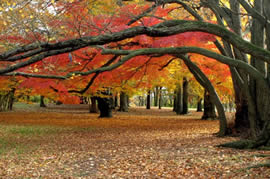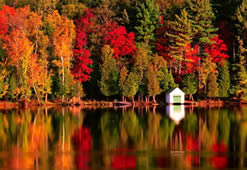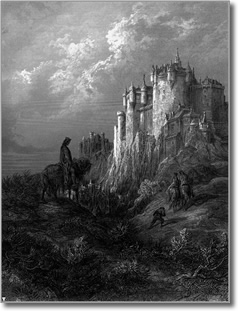Autumn begins today .. at 8:09 tonight PDT. That's when the sun slips quietly across the equator, heading south. Adios, amigo. Say hi to our friends down under. See you next spring.
 My favorite time of year. Warm days, brisk nights. The weather lends itself to clear-headed thinking.
My favorite time of year. Warm days, brisk nights. The weather lends itself to clear-headed thinking.
I grew up back East (in Connecticut) where the leaves change color. Dramatically so. People would come from all over to see.
No matter where I've lived -- and I've lived in a dozen different states over the years -- I've always felt a special affinity for the beginning of autumn. Even in Hawaii, you can feel autumn's arrival. (Comes in the air.)
Sunday I got into the spirit by riding my bike to the Back Bay (here in Newport Beach), where I said 'goodbye' to summer .. by enjoying its last weekend of the year.
Gorgeous day. One hand rested on the rubber grip of my handlebar; the other held a book of poetry .. by Tennyson (1809-1892), which included Charge of the Light Brigade. What a poem. (True story. Brits vs the Russians. October, 1854)
Half a league, half a league,
Half a league onward,
All in the valley of Death
Rode the six hundred.
'Forward, the Light Brigade!
Charge for the guns!' he said.
Into the valley of Death
Rode the six hundred.'Forward, the Light Brigade!'
Was there a man dismay'd?
Not tho' the soldier knew
Some one had blunder'd.
Their's not to make reply,
Their's not to reason why,
Their's but to do and die.
Into the valley of Death
Rode the six hundred.
Can you hear the hooves pounding the ground as the horses gallop? That's the first two stanzas. (I can recite the first three from memory.) The poem can be viewed as glorifying military ineptitude (something I'm familiar with) .. but still incredibly lyrical.
••• today's entry continues here below •••
 Rolling down the dirt path, I heard voices coming the other way .. along with the sound of my tires rolling over the gritty, hard-packed trail.
Rolling down the dirt path, I heard voices coming the other way .. along with the sound of my tires rolling over the gritty, hard-packed trail.
One girl was preaching to another. They must've just gotten out of church, cuz they were dressed nicely .. and were talking about love. Love, love, love.
".. but love is the most important thing," one said as they approached. Felt like we were having church outside .. on a gorgeous, Sunday afternoon. Preach it, sister,
I said.
Felt like God sent them there .. to say beautiful things .. just for me. Seemed like my wheels were rolling a good 6-inches off the ground.
The back cover of my book says:
T.S. Eliot, retrieving Tennyson from years of prejudice & neglect, described him as 'the most instinctive rebel against the society in which he was the most perfect conformist'.
Before he threw away his genius by attempting to conform to the Victorian idea of a Poet Laureate, Tennyson wrote some of the most beautiful lyrics in the language.
His poetry is personal, non-moral and sublimely resistant to literary criticism and psychoanalysis. Tennyson's greatness consists in a natural ability to express loss, desolation, despair and other irreducible emotions (.. which is probably why I enjoy his work so much).
Look in his eyes. He has seen a thing or two in his day, no? Everybody loves Tennyson. He had no other occupation except that of a poet.
» The Lady of Shalott (1833, Tennyson)
I also read the Lady of Shalott .. a little further down the trail, where I got off and walked.
On either side the river lie
Long fields of barley and of rye,
That clothe the wold and meet the sky;
And thro' the field the road runs by
To many-tower'd Camelot;
And up and down the people go,
Gazing where the lilies blow
Round an island there below,
The island of Shalott.Willows whiten, aspens quiver,
Little breezes dusk and shiver
Through the wave that runs for ever
By the island in the river
Flowing down to Camelot.
Four grey walls, and four grey towers,
Overlook a space of flowers,
And the silent isle imbowers
The Lady of Shalott.
Beautiful. Is that not incredibly lyrical? You can feel the atmosphere. (It goes on.) It's nectar days like this that sustain me thru the hard times.
Time Travel Back to the Height of the » Romantic Period
 More than once I have had the thought » if time travel were possible ..
More than once I have had the thought » if time travel were possible ..
.. I feel that the first half of the Nineteenth century .. would be interesting.
When the Romantic period was at its peak.
After the Age of Enlightenment (of the 18th century).
And before Realism came in the second half of the Nineteenth century
Of course, this is the writer's trick. He takes you there .. to these other times and places. Like a time-traveller.
But if he is extra clever .. he can sometimes bring the past » to you (right now).
"How is such a thing possible?" you ask? That's exactly the question I had myself. (We must be thinking along the same lines.)
[ Test update to MySQL 5.1.51. Update worked fine. ]
<ignore this intentional bottom text spacer>
